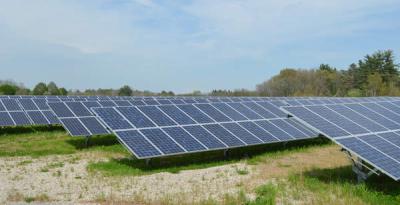Officials work on state law for taxation of solar farms
The Town of Dartmouth has brought in millions from solar farms over the years, after creating what is now considered the state standard for taxing the energy producers. But there’s no state law in place that specifies how the farms should be taxed, and after solar farm owners in Swansea found an outdated law that exempted them from paying, Dartmouth officials are working with state legislators to create that law.
In Dartmouth, solar panels are taxed as personal property, along with other equipment, explained Town Administrator David Cressman. In fiscal year 2017 alone, the town has brought in nearly $800,000 from this tax. However, solar or wind farms producing up to 125 percent of the annual energy needs of the owners are exempt from taxes. Owners only pay taxes when a farm generates energy in excess of the 125 percent, as they can profit from the energy produced.
“We have never taxed solar on somebody’s home,” Cressman noted in explaining the “125 percent” rule.
However, there’s a piece of legislation from the 1970s that was created due to an energy crisis at the time, the town administrator explained. It essentially says that as long as the power generated is used to power the home of the property owner, the property owner cannot be taxed at all.
The legislation led to a dispute in Swansea last year. Homeowners were taxed on their solar farm because it was a source of income. The couple sold excess energy credits — like a commercial enterprise — to Fall River Five Cents Savings Bank. The homeowners balked at the taxes and took the matter to the state Appellate Tax Board. Due to the 1970s law, the board sided with the homeowners.
While Swansea is considering an appeal or settlement, Dartmouth is working with 14 other towns — including Marion, Somerset, and Middleboro — to get legislation in place based on Dartmouth’s model of taxing the farms, Cressman said.
To date, no Dartmouth solar farm assessments have been appealed before the state Appellate Tax Board, the town administrator noted.
The proposed legislation will now go to state Senator Mark Montigny and Representative Chris Markey, who will usher it through the state legislature.
The legislation would not change how commercial alternative energy producers are taxed. Those systems are taxed unless the owner has a “payment in lieu of taxes” (PILOT) agreement in place with the city or town in which the farm is located.
Cressman said that both he and Director of Budget and Finance Greg Branes prefer taxes over PILOT agreements.














